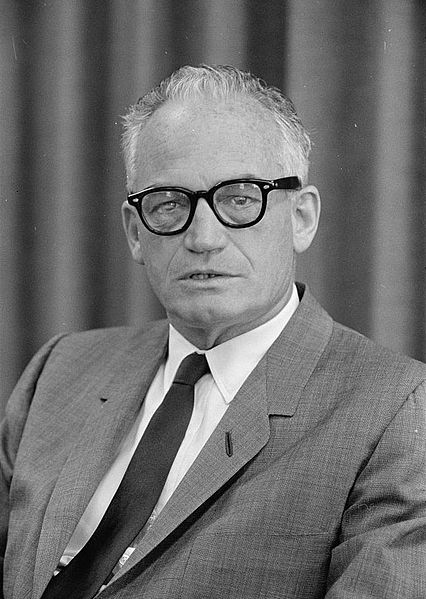Barry
Morris Goldwater (January 2, 1909[1] – May 29, 1998)
was a businessman and five-term United States Senator
from Arizona (1953–65, 1969–87) and the Republican
Party's nominee for president in the 1964 election. An
articulate and charismatic figure during the first half
of the 1960s, he was known as "Mr. Conservative".
Goldwater
is the politician most often credited for sparking the
resurgence of the American conservative political movement
in the 1960s. He also had a substantial impact on the
libertarian movement.
Goldwater
rejected the legacy of the New Deal and fought through
the conservative coalition against the New Deal coalition.
He mobilized a large conservative constituency to win
the hard-fought Republican primaries. Goldwater's right-wing
campaign platform ultimately failed to gain the support
of the electorate[3] and he lost the 1964 presidential
election to incumbent Democrat Lyndon B. Johnson by one
of the largest landslides in history, bringing down many
Republican candidates as well. The Johnson campaign and
other critics painted him as a reactionary, while supporters
praised his crusades against the Soviet Union, labor unions,
and the welfare state. His defeat allowed Johnson and
the Democrats in Congress to pass the Great Society programs,
but the defeat of so many older Republicans in 1964 also
cleared the way for a younger generation of American conservatives
to mobilize. Goldwater was much less active as a national
leader of conservatives after 1964; his supporters mostly
rallied behind Ronald Reagan, who became governor of California
in 1967 and the 40th President of the United States in
1981.
Goldwater
returned to the Senate in 1969, and specialized in defense
policy, bringing to the table his experience as a senior
officer in the Air Force Reserve. In 1974, as an elder
statesman of the party, Goldwater successfully urged President
Richard Nixon to resign when evidence of a cover-up in
the Watergate scandal became overwhelming and impeachment
was imminent. By the 1980s, the increasing influence of
the Christian right on the Republican Party so conflicted
with Goldwater's views that he became a vocal opponent
of the religious right on issues such as abortion, gay
rights, and the role of religion in public life. A significant
accomplishment in his career was the passage of the Goldwater-Nichols
Act of 1986, which restructured the higher levels of the
Pentagon by increasing the power of the Chairman of the
Joint Chiefs of Staff to direct military action.

United States Senator
from Arizona
UFOs
Goldwater
was one of the more prominent American politicians to
openly show an interest in UFOs.
On
March 28, 1975, Goldwater wrote to Shlomo Arnon: "The
subject of UFOs has interested me for some long time.
About ten or twelve years ago, I made an effort to find
out what was in the building at Wright-Patterson Air Force
Base where the information has been stored that has been
collected by the Air Force, and I was understandably denied
this request. It is still classified above Top Secret."
Goldwater further wrote that there were rumors the evidence
would be released, and that he was "just as anxious
to see this material as you are, and I hope we will not
have to wait much longer."
The
April 25, 1988, issue of The New Yorker carried an interview
where Goldwater said he repeatedly asked his friend, Gen.
Curtis LeMay, if there was any truth to the rumors that
UFO evidence was stored in a secret room at Wright-Patterson
Air Force Base, and if he (Goldwater) might have access
to the room. According to Goldwater, an angry LeMay gave
him "holy hell" and said, "Not only
can't you get into it but don't you ever mention it to
me again."
In
a 1988 interview on Larry King's radio show, Goldwater
was asked if he thought the U.S. Government was withholding
UFO evidence; he replied "Yes, I do."
He added:
"I certainly believe in aliens in space. They
may not look like us, but I have very strong feelings
that they have advanced beyond our mental capabilities...
I think some highly secret government UFO investigations
are going on that we don't know about – and probably
never will unless the Air Force discloses them."
Source:
http://en.wikipedia.org/wiki/Barry_Goldwater
